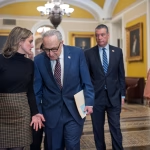Trump’s National Security Team Starts to Crack: Waltz and Wong Exit Raises Alarms.
In what may mark the early signs of disarray within Donald Trump’s second-term administration, National Security Adviser Mike Waltz and his deputy, Alex Wong, are set to exit the White House this week, multiple sources confirmed to CBS News. Their departure—expected Thursday—comes amid growing scrutiny, internal tensions, and fallout from a serious breach involving sensitive national security discussions.
The White House has yet to issue an official comment on the exits.

A Self-Inflicted Crisis
The departures follow a controversy that erupted in March when Waltz mistakenly added Atlantic editor Jeffrey Goldberg to a Signal chat thread containing senior national security officials. The thread reportedly discussed operational planning for U.S. military strikes on Houthi targets in Yemen. Goldberg, initially withholding operational details, later published them after top officials including Defense Secretary Pete Hegseth, Director of National Intelligence Tulsi Gabbard, and CIA Director John Ratcliffe denied classified information had been shared.
RELATED: Michael Waltz's Net Worth In 2025: From Military Service to National Security Advisor.
The published material included the timing of military strikes and specifics on weapons systems—a leak that stunned Washington. Waltz later admitted behind closed doors that the reporting was accurate, triggering fierce debate within the White House over whether he should resign. But Waltz remained, and President Trump publicly stood by him, saying he was “a good man” who had “learned a lesson.”
Now, only weeks later, both Waltz and Wong are quietly preparing to leave—no formal resignation letters, no public statements, just the unmistakable stench of a power structure beginning to wobble.

Wong’s Quiet Exit
Alex Wong’s resignation may not raise as many eyebrows on its own, but the timing is notable. Wong served in Trump’s first administration in key diplomatic roles, including as deputy special representative for North Korea. He played a key part in negotiating Trump’s historic—but ultimately inconclusive—summits with Kim Jong Un. His deep involvement in East Asian policy made him a critical bridge between the White House and regional diplomacy. His departure now signals further instability at a time when global tensions—from Taiwan to Ukraine—continue to rise.

More Than Just a Personnel Change?
While White House officials may frame the exits as routine turnover, the optics tell another story. This is not a coordinated transition of power or a strategic shuffle—it’s a messy fallout from a national security blunder, followed by quiet exits and a lack of transparency. Sources close to the administration have suggested that internal disagreements and mounting pressure over Trump's foreign policy decisions have exacerbated frustrations among senior staff.
The fact that the national security team is hemorrhaging talent just months into Trump’s second term is a red flag for allies and adversaries alike. There is also growing unease in Republican circles about the lack of discipline and the apparent return of the chaos that characterized much of Trump’s first administration.

The Beginning of the Unraveling?
Critics argue that these departures, particularly following a scandal involving national security leaks, may be the canary in the coal mine. With tensions within Trump’s inner circle escalating and long-standing loyalists beginning to lose faith or face ousting, the cracks in this administration are starting to show.
President Trump may brush off the resignations as inconsequential, but the loss of two high-profile members of the national security team—especially under a cloud of controversy—undermines the image of strength and stability he has tried to project.
Only time will tell if these are isolated departures or the start of a broader unraveling. But as it stands now, the exits of Mike Waltz and Alex Wong feel less like a bump in the road and more like the beginning of a slide into dysfunction.














